Category / Research news
Retaining Special Constables…Myth v Reality!

Hard at Work…Mapping Interview Data!
Dr Lois Farquharson is working on an exciting research project for Dorset Police and Devon & Cornwall Police which focuses on the lived experience of Special Constables and its impact on retention. This research is being undertaken jointly with Dr Iain Britton and Dr Matt Callender from The Institute for Public Safety, Crime and Justice (IPSCJ) at University of Northampton. We are also delighted to have a BU MBA student, Steven Kueberuwa, involved in the project.
Key areas which the project delves into in detail are:
- Motivations and expectations when joining the force
- Recruitment and training
- Knowledge translation, development and pathways to independence
- Worklife balance and impacts on ‘being’ a Special Constable
- Relationships, support and morale
- Organisational culture and environment
- Job satisfaction and future intentions
Individual in-depth interviews have taken place with Special Constables across both constabularies from May through July. Today was our first workshop focusing on mapping the data – intense, but very enjoyable – watch this space for more info on findings and outputs in due course.
Non-Invasive Prenatal Testing: The Challenges for Public Health, Law & Ethics
A one-day Workshop on 20 July 2016, hosted by the Centre for Conflict, Rule of Law and Society at Bournemouth University and exploring recent developments in prenatal screening and the resulting challenges for public health, the law and ethics.
Aims of the Workshop:
The UK already operates a fairly comprehensive prenatal screening programme. The discovery of cell-free fetal DNA in maternal blood has made it possible to undertake additional, accurate and reliable tests that present minimal risk to mother and the developing fetus. The UK RAPID evaluation study1 has recently reported on the contingent use of non-invasive prenatal testing (NIPT) for Down’s syndrome and the UK National Screening Committee (UKNSC) will shortly have to make a decision about the public provision of these tests within the NHS.
This event will draw upon contributions from speakers from a wide range of disciplines and will explore a variety of medical, social, ethical and legal perspectives. The aim of the day will be to identify benefits, challenges and possible outcomes for this new technology.
We are pleased to announce that the workshop will be chaired by Professor Roger Brownsword of Kings College London & Bournemouth University. Contributors will include speakers from UKNSC and the Nuffield Council on Bioethics.
Date : 20th of July 2016
Location: Bournemouth University, Executive Business Centre (7th Floor, EB708), 89 Holdenhurst Road, Bournemouth, BH8 8EB
More information can be found here.
Lunchtime Seminar: CBT for MS Fatigue – from individual to technology-based interventions – 29th July 2016

Dr Kirsten Van Kessel a clinical psychologist from the Auckland University of Technology, New Zealand is visiting Bournemouth University Clinical Research Unit as part of study leave
You are cordially invited to a lunchtime research seminar she is presenting which is open to all students and staff. (Please feel free to bring your lunch).
“Cognitive Behaviour Therapy for Multiple Sclerosis Fatigue: from individual to technology-based interventions”
by Dr Kirsten van Kessel
Friday 29 July 2016
13.00 – 13.50pm
Create Lecture Theatre, Fusion Building, Talbot Campus
Abstract:
There have been promising findings of cognitive behavioural therapy (CBT) approaches delivered by health professionals for the management of Multiple Sclerosis fatigue, including one-on-one and group based delivered CBT. However, such health professional delivered interventions for fatigue management can be impractical due to a shortage of trained therapists, limited access to rehabilitation and funding constraints. As such, exploring and evaluating alternative delivery mechanisms for CBT is an important area in clinical intervention research. This presentation will focus on how evidence based individual and group delivered CBT protocols have been used to develop technology based interventions for Multiple Sclerosis fatigue.
Presenter:
Dr Kirsten van Kessel is a Clinical Psychologist and Senior Lecturer in the Department of Psychology at the Auckland University of Technology in New Zealand. She has particular interest and expertise in CBT and its application to mental and physical health problems. Her doctoral thesis was a randomised controlled trial assessing the efficacy of CBT for people with multiple sclerosis fatigue. Current research interests include evaluating CBT for psychological and/or physical health issues, as well as the development and evaluation of eHealth interventions.
Jo Johnson to be quizzed on Brexit
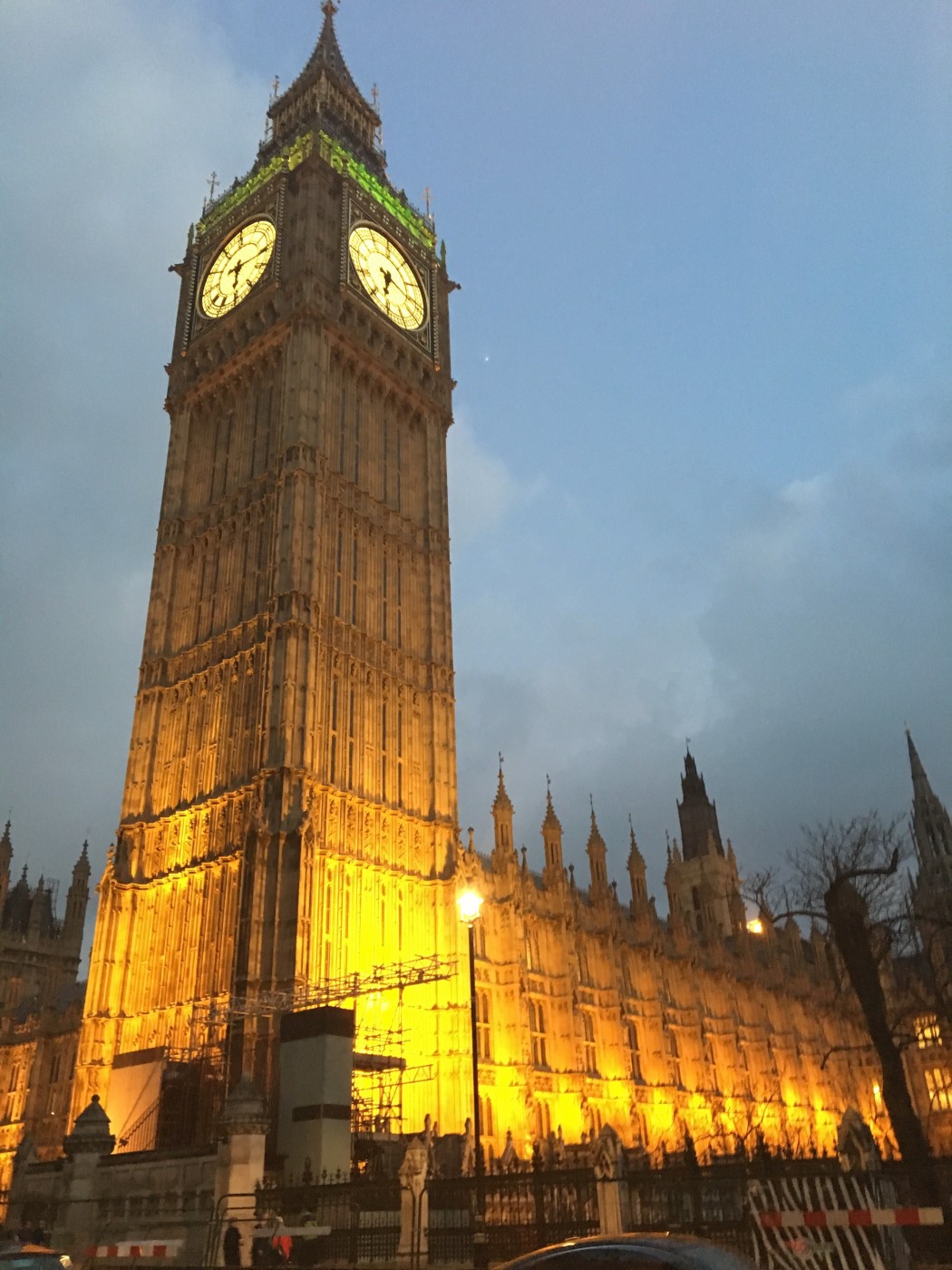 The House of Commons’ Science and Technology Select Committee will today (13/7/16) hold an evidence session on the implications of Brexit for science and research. Jo Johnson will be appearing before the committee alongside Professor Philip Nelson of RCUK and several senior officials from BIS. Johnson has signalled his commitment to make Brexit work for universities, and has stated that ongoing projects such as Horizon 2020 should be carrying on as normal.
The House of Commons’ Science and Technology Select Committee will today (13/7/16) hold an evidence session on the implications of Brexit for science and research. Jo Johnson will be appearing before the committee alongside Professor Philip Nelson of RCUK and several senior officials from BIS. Johnson has signalled his commitment to make Brexit work for universities, and has stated that ongoing projects such as Horizon 2020 should be carrying on as normal.
You can watch the evidence session here from 9.30am onwards.
British Academy launches interdisciplinarity report
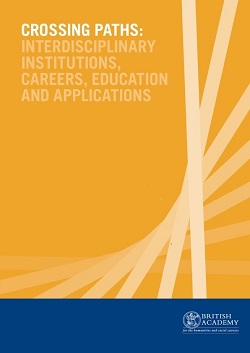 The British Academy has today published a report examining the opportunities and barriers to interdisciplinarity, from the point of view of all research career stages and institutional levels.
The British Academy has today published a report examining the opportunities and barriers to interdisciplinarity, from the point of view of all research career stages and institutional levels.
Crossing paths: interdisciplinary institutions, careers, education and applications considers support for interdisciplinary research (IDR) across the UK’s research and higher education sector, with a focus on university structures, funding, and evaluation. Case studies on interdisciplinarity at the undergraduate level and on how interdisciplinary research can influence public policy are also provided.
Finding broad and deep support for IDR, Crossing paths makes recommendations to allow researchers, including those early in their career, to pursue high quality IDR alongside, or as part of, cultivating an academic home, a secure base from which to carry out IDR.
The report is based on a call for evidence as well as roundtable discussions and visits to interdisciplinary research centres at UK universities.
Professor Roger Kain FBA, VP for Higher Education and Research at the British Academy, said:
“This report tackles an important topic at a turbulent time for the UK’s higher education sector, which is being encouraged to place an even greater emphasis on IDR. The opportunities for IDR are enormous, enabling researchers to unpick some of society’s most complex challenges and bringing greater rigour to our understanding of our own disciplines. Adopting the recommendations in this report would mitigate some of the risks that currently exist to pursuing it.”
The full report is available to download at www.britishacademy.ac.uk/interdisciplinarity
Brexit and the implications for Open Access
Whilst it’s relatively early to predict what Brexit will mean for Open Access in the UK, JISC recently released a blog post outlining the main issues that will arise from the UK’s decision to leave the EU.
The blog post raises issues around the future of EU OA policy and also funding.
At the present time, it appears the main effect of Brexit will be to create greater reliance on Green OA (usually accepted, peer-reviewed versions of outputs) rather than gold paid open access owing to fluctuating financial markets and uncertainty surrounding future European funding.
Library and Learning Support have recently created a OA support video, looking at the benefits of OA and how you can make your research OA through engaging with BRIAN and BURO.
Please contact the BURO team with any queries you may have and we will be happy to help.
Don’t forget our guide Open Access and Depositing your research
Call for Gender Experts for Horizon 2020
We have received the following invitation to join the Database of Gender Experts for European Research and Innovation.
Dr. Ineke Klinge, Chair H2020 Advisory Group on Gender, invites GenPORT members (free to register) to join the H2020 database as gender experts.
 Horizon 2020 considers gender as a cross-cutting issue and it shall be adequately integrated in research and innovation content at the level of Work Programmes and projects. Applicants to Horizon 2020 calls are encouraged to include the gender dimension in their proposals. The European Commission is continuously looking for experts with gender expertise in all areas of Horizon 2020 calls to evaluate submitted research proposals.
Horizon 2020 considers gender as a cross-cutting issue and it shall be adequately integrated in research and innovation content at the level of Work Programmes and projects. Applicants to Horizon 2020 calls are encouraged to include the gender dimension in their proposals. The European Commission is continuously looking for experts with gender expertise in all areas of Horizon 2020 calls to evaluate submitted research proposals.
To find experts with relevant expertise who are willing to evaluate research proposals, the Commission uses an online database. You can register your expertise for gender, and other areas in which you wish to be considered as an expert, in this database on the Participant Portal.
It is very important that you indicate your gender expertise next to your original / main area of training and this has now become much easier than in the past. The Commission therefore encourages you to signal your gender expertise, whether you register for the first time or would like to update your expertise. In the following links you will find:
1) Criteria for gender expertise, as established by the Horizon 2020 Advisory Group on Gender, and
2) Guidance on how to signal your gender expertise in the database prepared by the Gender Sector of DG Research and Innovation.
The European Commission will greatly appreciate your cooperation in increasing the number of experts with gender expertise in its expert database.
If you are keen to know more about gender in funding and participate in this group, please register on GenPORT.
RCUK GCRF Call for Evidence
 The Government Spending Review on 25th November 2015 announced “a new £1.5 billion Global Challenges Research Fund, to ensure UK science takes the lead in addressing the problems faced by developing countries, whilst developing our ability to deliver cutting-edge research”. The Global Challenges Research Fund is a BIS initiative which operates across a number of delivery partners, including the Research Councils, National Academies and HEFCE.
The Government Spending Review on 25th November 2015 announced “a new £1.5 billion Global Challenges Research Fund, to ensure UK science takes the lead in addressing the problems faced by developing countries, whilst developing our ability to deliver cutting-edge research”. The Global Challenges Research Fund is a BIS initiative which operates across a number of delivery partners, including the Research Councils, National Academies and HEFCE.
The RCUK Global Challenges Research Fund (GCRF) represents the largest portion of this Fund. They have launched a call for evidence to gather your views on the high-level challenges that will form the basis of the funding calls from the GCRF Collective Fund, the information gathered will also be shared with the other delivery partners so that it may inform their own strategies. They would also like your views on the most effective ways of delivering GCRF.
They are seeking inputs from individuals and institutions across all academic disciplines, non-governmental organisation and industrial sectors both in and outside of the UK.
The results from the survey will be reviewed alongside feedback from the Town Meetings. They will share a short summary of evidence they have collected and outline how that has informed their strategy in the autumn.
This call for evidence forms part of a broader programme of strategic engagement activities taking place under the GCRF programme. They will be running focus groups later this year and opening a Call for Ideas early next year to generate priority themes within each challenge.
You can complete the survey by clicking the link below. The survey closes at 16.00 on 22 August:
http://www.smartsurvey.co.uk/s/6LOJI/
Respondents are encouraged to familiarise themselves with the following background information whilst completing the survey:
FoL debate highlighted on USA website
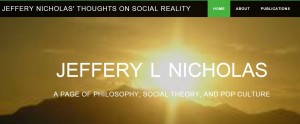 Last week’s Festival of Learning debate on the motion: “Advising pregnant women to avoid drinking alcohol during pregnancy is symptom of the Nanny State and another step towards the medicalisation of childbirth” has just been hightlighted in the USA. Our work featured on Jeffery Nicholas’ thoughts on social reality, a site established by Prof. Jeff Nicholas (click here!). Prof. Nicholas is a philospher based at Providence College with an interest in midwifery in society.
Last week’s Festival of Learning debate on the motion: “Advising pregnant women to avoid drinking alcohol during pregnancy is symptom of the Nanny State and another step towards the medicalisation of childbirth” has just been hightlighted in the USA. Our work featured on Jeffery Nicholas’ thoughts on social reality, a site established by Prof. Jeff Nicholas (click here!). Prof. Nicholas is a philospher based at Providence College with an interest in midwifery in society.
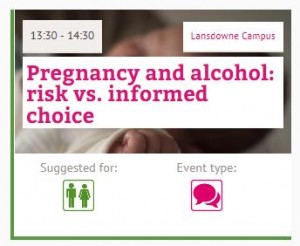
Faculty of Health & Social Sciences’ Liz Norton and Edwin van Teijlingen affiliated with the Centre for Midwifery, Maternal & Perinatal Health (CMMPH) argued in favour of the motion. Donna Wixted, Joint Bournemouth University (BU)-Portsmouth Hospitals NHS Trust, doctoral student and Greta Westwood of Portsmouth Hospitals NHS Trust & the University of Southampton argued strongly against the motion. The exciting debate was chaired by Prof. Vanora Hundley from the Faculty of Health & Social Sciences.
Presentation PhD student Jib Acharya in Liverpool
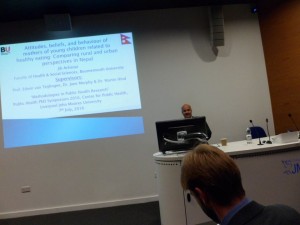 Mr. Jib Acharya (FHSS) gave an interesting presentation yesterday about the qualitative research findings of his PhD at Liverpool John Moores University. Jib’s PhD research focused on the knowledge, attitudes and beliefs of poor women in Nepal about healthy eating and the study also identifies major food barriers.
Mr. Jib Acharya (FHSS) gave an interesting presentation yesterday about the qualitative research findings of his PhD at Liverpool John Moores University. Jib’s PhD research focused on the knowledge, attitudes and beliefs of poor women in Nepal about healthy eating and the study also identifies major food barriers.
His mixed-methods approach combines a quantitative questionnaire survey with qualitative research. Jib’s research project is supervised by Dr. Jane Murphy, Dr. Martin Hind and Prof. Edwin van Teijlingen. Some of the preliminary findings of this FHSS thesis have already been published in two scientific journals [1-2].
References:
- Acharya, J., van Teijlingen, E., Murphy, J., Hind, M. (2015) Assessment of knowledge, beliefs and attitudes towards healthy diet among mothers in Kaski, Nepal, Participation 17(16): 61-72.
- Acharya, J., van Teijlingen, E., Murphy, J., Hind, M. (2015) Study of nutritional problems in preschool aged children in Kaski District in Nepal, Journal of Multidisciplinary Research in Healthcare 1(2): 97-118. http://dspace.chitkara.edu.in/jspui/bitstream/1/560/1/12007_JMRH_Acharya.
Book Launch in San Francisco
I was delighted to launch my new book ‘Pedro Zamora, Sexuality, and AIDS Education: The Autobiographical Self, Activism and the Real World’ making a presentation at the GLBT Historical Society in San Francisco. This book is the product of study leave through Fusion funding, that I worked on a little while back. At the book launch, it was wonderful that despite its been over 22 years since Pedro was last in San Francisco (and he passed a away a few months later) that so many people came to the event, and were interested in his story, including some that knew Pedro personally. Also it was flattering that representatives from the AIDS Memorial Grove attended the event that have an academic scholarship in Pedro’s name, and that I was interviewed by two journalists, including Brian Bromberger who published this review in the Bay Area Reporter.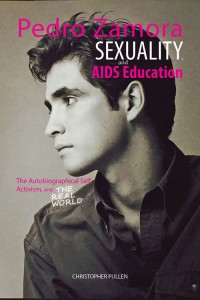
New CMMPH paper by PhD student Sheetal Sharma
 Today saw the publication in BMC Pregnancy & Childbirth of the paper ‘Dirty and 40 days in the wilderness: Eliciting childbirth and postnatal cultural practices and beliefs in Nepal’ with as lead author FHSS PhD student Sheetal Sharma [1]. This paper argues that pregnancy and childbirth are very much socio-cultural events that carry varying meanings across different societies and cultures. These are often translated into social expectations of what a particular society expects women to do (or not to do) during pregnancy, birth and/or the postnatal period. The study explored beliefs around childbirth in Nepal, a low-income country with a largely Hindu population. The paper then sets these findings in the context of the wider global literature around issues such as periods where women are viewed as polluted (or dirty even) after childbirth.
Today saw the publication in BMC Pregnancy & Childbirth of the paper ‘Dirty and 40 days in the wilderness: Eliciting childbirth and postnatal cultural practices and beliefs in Nepal’ with as lead author FHSS PhD student Sheetal Sharma [1]. This paper argues that pregnancy and childbirth are very much socio-cultural events that carry varying meanings across different societies and cultures. These are often translated into social expectations of what a particular society expects women to do (or not to do) during pregnancy, birth and/or the postnatal period. The study explored beliefs around childbirth in Nepal, a low-income country with a largely Hindu population. The paper then sets these findings in the context of the wider global literature around issues such as periods where women are viewed as polluted (or dirty even) after childbirth.
Sheetal is doing ve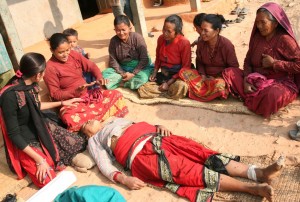 ry well with her PhD publications as a few weeks ago her major quantitative findings paper was published in PLOS One [2]. Both papers are published in Open Access journals and therefore easily available to researchers, health promotors, health care providers and health policy-makers in low-income countries. Sheetal evaluated a research project funded by the London-based charity Green Tara Trust. Her PhD is supervised by Dr. Catherine Angell, Prof. Vanora Hundley and Prof. Edwin van Teijlingen all nbased in CMMPH with external supervision from BU Visiting Faculty Prof. Padam Simkhada (liverpool John Moores University).
ry well with her PhD publications as a few weeks ago her major quantitative findings paper was published in PLOS One [2]. Both papers are published in Open Access journals and therefore easily available to researchers, health promotors, health care providers and health policy-makers in low-income countries. Sheetal evaluated a research project funded by the London-based charity Green Tara Trust. Her PhD is supervised by Dr. Catherine Angell, Prof. Vanora Hundley and Prof. Edwin van Teijlingen all nbased in CMMPH with external supervision from BU Visiting Faculty Prof. Padam Simkhada (liverpool John Moores University).
References:
- Sharma, S., van Teijlingen, E., Hundley, V., Angell, C., Simkhada, P. (2016) Dirty and 40 days in the wilderness: Eliciting childbirth and postnatal cultural practices and beliefs in Nepal BMC Pregnancy & Childbirth 16: 147 https://bmcpregnancychildbirth.biomedcentral.com/articles/10.1186/s12884-016-0938-4
- Sharma, S., van Teijlingen, E., Belizán, J.M., Hundley, V., Simkhada, P., Sicuri, E. (2016) Measuring What Works: An impact evaluation of women’s groups on maternal health uptake in rural Nepal, PLOS One 11(5): e0155144 http://journals.plos.org/plosone/article?id=10.1371%2Fjournal.pone.0155144
New Harding and Pritchard paper in international health policy journal
 Andrew Harding and Colin Pritchard have recently had a paper published in the International Journal of Health Policy and Management.
Andrew Harding and Colin Pritchard have recently had a paper published in the International Journal of Health Policy and Management.
The paper, titled ‘UK and Twenty Comparable Countries GDP-Expenditure on-Health 1980 2013: The Historic and Continued Low Priority of UK Health Related Expenditure, uses GDPEH data to outline the low proportional commitment that the UK makes to healthcare expenditure. It is well established in the health and social policy world that the UK prioritises less of its wealth to health than almost any comparable country. However, the authors use an innovative and novel means of exploring proportional differences in commitment.
The key finding is that since 1980, in order to meet the mean average European health spend, the UK would have needed to have made an additional commitment of one-fifth. For the final period, between 2010-2013 the authors show that the UK has prioritised 12% less in proportional terms (as a % of GDP) than the European average.
The paper ends with the following quote, “Echoing others who have recently contributed to discussion in this area, if other comparable countries can make a larger proportional commitment and deem it affordable, in light of aforementioned challenges, why cannot the United Kingdom prioritise accordingly?”
BU academics launch EU Referendum Analysis report within ten days of the vote
Featuring 80 contributions from 100 leading UK academics, this publication captures the immediate thoughts, reflections and early research insights on the 2016 Referendum on UK Membership of the European Union from the cutting edge of media and politics research.
Published 10 days after the election, these contributions are short and accessible. Authors provide authoritative analysis of the campaign, including research findings or new theoretical insights; to bring readers original ways of understanding the referendum and its consequences. Contributions also bring a rich range of disciplinary influences, from political science to fan studies, journalism studies to advertising.
The publication is available as a downloadable PDF, as a website and as a printed report.
We are hosting an invitation only launch event at the House of Commons (18 July) and an open event on Brexit in Leicester (IAMCR pre-conference, 27 July).
You can register for the conference here:
https://www.eventbrite.co.uk/e/the-brexit-campaign-2016-uk-referendum-on-membership-of-european-union-tickets-24771805136
EU Referendum Analysis website:
http://www.referendumanalysis.eu
Direct PDF download:
http://bit.ly/EUReferendumAnalysis2016_Jackson-Thorsen-and-Wring_v1
Thanks to all of our contributors and production staff who helped make the quick turnaround possible. We hope it makes for a vibrant and engaging read!
TABLE OF CONTENTS
Introduction: the Brexit campaign (Daniel Jackson, Einar Thorsen and Dominic Wring)
Section 1: Context
1. EEC/EU campaigning in long-term perspective (Jay Blumler)
2. From Super-Market to Orwellian Super-State: the origins and growth of newspaper scepticism (Dominic Wring)
3. Understanding the role of the mass media in the EU Referendum (Mike Berry)
4. Brexit: the destruction of a collective good (Chris Gifford)
5. How the Brexit outcome has changed our understanding of referendums (John Fitzgibbon)
6. The referendum and Britain’s broken immigration politics (Andrew Geddes)
7. The great miscalculation: David Cameron’s renegotiation and the EU Referendum campaign (Andrew Glencross)
Section 2: Politics
8. Rhetoric of excess (James Martin)
9. Myth versus fact: are we living in a post-factual democracy?(Susan Banducci and Dan Stevens)
10. Destroying and building democracy, a German view(Catherine Goetze)
11. Remembrance of Referendums Past: Scotland in the campaign (Michael Higgins)
12. Public personalities in the EU debate: Elites vs. the majority and Bullingdon resurgent(Nathan Farrell)
13. Healthier ever after? The NHS as a campaign issue (Tamara Hervey)
14. Wales, immigration, news media and Brexit (Kerry Moore)
15. The referendum campaign and the public’s constitutional understanding (David Yuratich)
16. The EU referendum and the Country of Origin principle (COO) (Irini Katsirea)
17. Calming the storm: fighting falsehoods, fig leaves and fairy tales (Alan Renwick, Matthew Flinders and Will Jennings)
Section 3: News
18. The press and the Referendum campaign (David Levy, Billur Aslan and Diego Bironzo)
19. The narrow agenda: how the news media covered the Referendum (David Deacon, John Downey, Emily Harmer, James Stanyer and Dominic Wring)
20. Newspapers’ editorial opinions during the referendum campaign (Julie Firmstone)
21. Brexit ‘mansplained’: news coverage of the EU Referendum (Emily Harmer)
22. Scrutinising statistical claims and constructing balance: television news coverage of the 2016 EU Referendum (Stephen Cushion and Justin Lewis)
23. Regulated equivocation: the referendum on radio (Guy Starkey)
24. Referendum night goings on (Stephen Coleman)
25. The view from across the pond: Brexit on American media (Filippo Trevisan)
26. A victory of the nation state: the EU Referendum in the Southern European press (Iñaki Garcia-Blanco)
Section 4: Journalism
27. How our mainstream media failed democracy (Steven Barnett)
28. Divided Britain? We were already divided… (Des Freedman)
29. Deliberation, distortion and dystopia: the news media and the referendum (Charlie Beckett)
30. UK newspapers and the EU Referendum: Brexit or Bremain?(Oliver Daddow)
31. X marks the spot but the Ys have it: Referendum coverage as a boys’ own story (Karen Ross)
32. Mind the gap: the language of prejudice and the press omissions that led a people to the precipice (Paul Rowinski)
33. ‘They don’t understand us’: UK journalists’ challenges of reporting the EU (Anna Wambach)
34. Bending over backwards: the BBC and the Brexit campaign (Ivor Gaber)
35. Bums gone to Iceland: England, Brexit and Euro 2016 (Roger Domeneghetti)
36. It’s the ‘primary definers’, stupid! (Chris Roberts)
37. Brexit: inequality, the media and the democratic deficit (Natalie Fenton)
Section 5: Campaign and Political Communication
38. Why facts did matter in the campaign (Christoph Meyer)
39. Less a soap opera, more a fantasy drama? (John Street)
40. The rhetoric of the EU Referendum campaign (Andrew S. Crines)
41. A (very) brief period of Habermasian bliss (Mick Temple)
42. The toxicity of discourse: reflections on UK political culture following the EU Referendum (Katy Parry)
43. Britishness and Brexit (Frances Smith)
44. Neither tackling lies nor making the case: the Remain side (Kirsty Hughes)
45. Break-point for Brexit? How UKIP’s image of ‘hate’ set race discourse reeling back decades (James Morrison)
46. Referendum campaign broadcasts on television: A generational clash? (Vincent Campbell)
47. Interaction and ‘the floor’ in the televised debates of the EU referendum campaign(Sylvia Shaw)
48. Comedy clubs offered a better quality of debate than the political stage (Sophie Quirk)
49. ‘Project Art’ versus ‘Project Fear’: the art establishment against Brexit (Matt Hills)
50. Notes for editors: what the campaign press releases tell us about Vote Leave and Britain (Paula Keaveney)
Section 6: Parties
51. The triumph and tribulations of Conservative Euroscepticism(Philip Lynch)
52. Celebrity politicians and populist media narratives: the case of Boris Johnson (Mark Wheeler)
53. ‘Tuck your shirt in!’ It’s going to be a bumpy ride: Boris Johnson’s swerve to Brexit (Candida Yates)
54. ‘Conservative party future?’ Party disunity, the media and the EU Referendum (Anthony Ridge-Newman)
55. Cameron and the Europe question: Could it have ended any other way? (Tristan Martin)
56. The Liberal Democrats: the EU Referendum’s invisible party (Andrew Russell)
57. The Durham miners’ role in Labour’s culture wars (Eunice Goes)
58. The immigration debate: Labour versus Leave in the battle to win public trust (Thom Brooks)
59. The age of Nigel: Farage, the media, and Brexit (Neil Ewen)
Section 7: Social Media
60. Leave versus Remain: the digital battle (Andrew Mullen)
61. The results are in and the UK will #Brexit: What did social media tell us about the UK’s EU referendum? (Clare Llewellyn and Laura Cram)
62. Automatic polling using Computational Linguistics: more reliable than traditional polling? (Massimo Poesio, John Bartle, Jacqueline Bechet, Fabio Celli, Carmelo Ferrante, Marc Poch, Hugo Zaragoza and Giuseppe Riccardi)
63. Impact of social media on the outcome of the EU referendum (Vyacheslav Polonski)
64. Talking past each other: the Twitter campaigns (Simon Usherwood and Katharine Wright)
65. Political memes and polemical discourse: the rise of #usepens (Mary Mitchell)
66. E-newsletters, persuasion and the referendum (Nigel Jackson)
67. United by what divides us: 38 Degrees and the EU Referendum (James Dennis)
68. Boris, Brexit or bust (Alec Charles)
Section 8: Voters
69. What explains the failure of ‘Project Fear’? (Jane Green)
70. Workers rights in the EU and out: social class and the trade unions’ contribution to the debate (Jen Birks)
71. ‘I want my country back’: Emotion and Englishness at the Brexit ballotbox (Russell Foster)
72. Mixed feelings: how citizens expressed their attitudes towards the EU (Darren G. Lilleker)
73. ‘We want our country back’ – stop sneering, start listening (Michael Skey)
74. Young people in a changing Europe: British youth and Brexit 2016 (Matt Henn and Darren Sharpe)
75. Bonfires and Brexterity: what’s next for women? (Charlotte O’Brien)
76. The ‘Referendum Bubble’: what can we learn from EU campaign polling? (Louise Thompson)
77. Did the EU Referendum boost youth engagement with politics? (Stuart Fox and Sioned Pearce)
78. Campaign frames in the Brexit referendum (Sofia Vasilopoulou)
79. The emotional politics of the EU Referendum: Bregrexit and beyond (Karin Wahl-Jorgensen)
New paper FHSS Dr. Sarah Collard
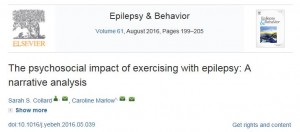 Congratulations to Dr. Sarah Collard on her latest paper ‘The psychosocial impact of exercising with epilepsy: A narrative analysis’ in Epilepsy & Behavior. The paper offers valuable insight into the psychosocial benefits of and barriers to exercising with epilepsy and draw attention to the individual differences in how a person with epilepsy copes with uncontrolled seizures and their impact on his/her exercise routine. This knowledge can lead to future research in exploring how a person with epilepsy can overcome these barriers to exercise and encourage more people with epilepsy to enjoy the benefits of exercise.
Congratulations to Dr. Sarah Collard on her latest paper ‘The psychosocial impact of exercising with epilepsy: A narrative analysis’ in Epilepsy & Behavior. The paper offers valuable insight into the psychosocial benefits of and barriers to exercising with epilepsy and draw attention to the individual differences in how a person with epilepsy copes with uncontrolled seizures and their impact on his/her exercise routine. This knowledge can lead to future research in exploring how a person with epilepsy can overcome these barriers to exercise and encourage more people with epilepsy to enjoy the benefits of exercise.
Congratulations!
Prof. Edwin van Teijlingen
CMMPH
BU’s LEAP staff & SERT placement students featured in local Indonesian news regarding human elephant conflict in Northern Sumatra
In June, Dr Amanda Korstjens, 10 UG and 1 PGT student together with MRes student Emma Hankinson and PhD student Chris Marsh from the Life and Environmental Sciences and the Archaeology, Anthropology and Forensic Sciences Departments took part in a field trip to Indonesia run by Dr. Amanda Korstjens to investigate human wildlife conflict and ecotourism in Indonesia. The placements fall within the SERT scheme and the research forms part of LEAP: Landscape Ecology and Primatology http://go-leap.wix.com/home.
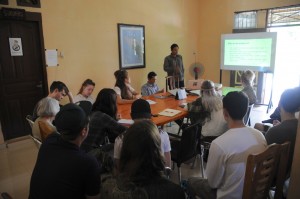
One of our activities involved a visit to Langsa. In Langsa, in the Aceh province of northern Sumatra, the group met up with Rudi Putra of HAkA and FKL (Forest, Nature, Enviroment of Aceh & Leuser Conservation Forum) and winner of the 2014 Goldman Environmental Prize http://www.goldmanprize.org/recipient/rudi-putra to discuss the problems faced in preserving the Leuser ecosystem and wildlife in Indonesia.
The group of staff and students first visited the CRU Conservation response unit in Serbajadi Aceh Timur where they met with Tezar Pahlevie, the regional manager of HAkA and FKL, Dedek Makam, the CRU coordinator of the region, and Ilham Fonna, Wildlife Protection Team supervisor for FKL to learn about the problems the wild elephants are facing, including human wildlife conflict, poaching and deforestation. The group were able to meet the captive elephants that are used in protecting and patrolling against poaching and other illegal activities in the area and to chase away marauding wild elephants from plantations.
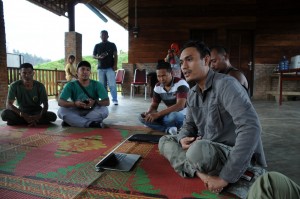
Staff and students then visited a local palm-oil plantation with Tezar Pahlevie to investigate the undergoing human elephant conflict and regular destruction of palm oil plantations in the area. Whilst travelling to the plantation, local journalists, Said Moulana SH from TVRI and Luth Pi from Net TV joined the university group and began filming the events of the day for local Indonesian news https://www.youtube.com/watch?v=5WoaPLDs43g and news articles were also published regarding the events of the day http://pelita8.com/mahasiswa-inggris-kunjungi-kawasan-yang-di-rusak-gajahliar-di-aceh-timur (more can be found below). Once at the plantation, the group explored the impacts that wild elephants are having on surrounding local businesses and communities, including an interview with the plantation manager, Usman Hanapiah and visits to the areas most badly affected by the wild elephants. All of the students were involved in the interview and explored the impacts, attempted resolves and the potential future solutions regarding the human elephant conflict, and the overall future of the plantation and the wild elephants.
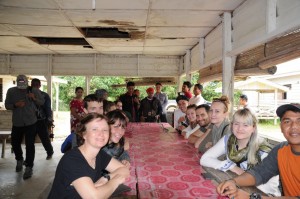
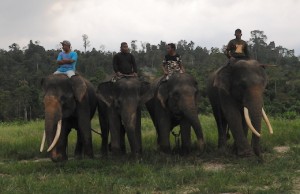
Many students received funds for the trip from the Departmental International Travel Grant, Global Horizons, or the Project & Placement fund of the Alumni. The Life and Environmental Sciences Department International Travel Grant funded Dr Korstjens’s expenses and those for co-leader Emma Hankinson (MRes student) and Chris Marsh (PhD student), who are currently conducting their field research in Indonesia. The work forms part of LEAP’s elephant project: http://go-leap.wix.com/home#!elephants/c578 which is funded by the International Elephant Foundation M. Phil Kahl fellowship (2016) and Rufford Small Grants (2016) and People’s Trust for Endangered Species (PTES, 2016)
Written by Nicola Collins who is supporting LEAP as a BU-funded Undergraduate Research Assistant Placement student.
For more information visit:
LEAP: Landscape ecology and Primatology: http://go-leap.wix.com/home
HAkAR: http://www.haka.or.id
FKL: https://www.facebook.com/Forum-Konservasi-Leuser-FKL-219705561560977/
More Indonesian news articles published regarding the palm oil plantation visit:
http://www.kanalaceh.com/2016/06/19/mahasiswa-inggris-teliti-konflikgajah-manusia-di-aceh-timur/
http://www.acehtraffic.com/2016/01/aceh-timur-miliki-cru-serbajadi.html
Would you like to test the new research council grants system?
 The research councils are replacing their electronic grants submission service, Je-S, in 2017. More information about this project can be found here http://www.rcuk.ac.uk/funding/2017update/
The research councils are replacing their electronic grants submission service, Je-S, in 2017. More information about this project can be found here http://www.rcuk.ac.uk/funding/2017update/
They are looking for more people to get involved in user research. Can you help?
Initially they are looking for researchers; they need to test with both people who have never applied for a research grant through the Je-S system before as well as those who are more frequent applicants. At this stage they will predominantly be testing prototypes with users. User testing will be carried out throughout the year in a number of formats, such as site visits, remotely over Skype, or through labs where users go to a central location nearby.
Test sessions will take between half an hour to an hour. If you are interested in being a tester then please can you let me, Jo Garrad, know by 15th July 2016. You will need to provide me with the following information:
- Name
- Organisation
- Academic Discipline (high level)
- Email address and telephone number
- Have you got experience of applying for grants? yes/no
- Are you likely to apply for grants in the future but haven’t done so to date? yes/no
- Do you work in a research development, finance or other research office role? yes/no
- Have you conducted peer reviews for the Research Councils or any other funder before? yes/no
- Have you sat on an assessment or moderating panel for the Research Councils or any funder before? yes/no











 FHSS academics teaching in Nepal
FHSS academics teaching in Nepal New weight change BU paper
New weight change BU paper One week to go! | The 16th Annual Postgraduate Research Conference
One week to go! | The 16th Annual Postgraduate Research Conference Geography and Environmental Studies academics – would you like to get more involved in preparing our next REF submission?
Geography and Environmental Studies academics – would you like to get more involved in preparing our next REF submission? Congratulations to three former BU staff
Congratulations to three former BU staff MSCA Staff Exchanges 2024 Call – internal deadline
MSCA Staff Exchanges 2024 Call – internal deadline Applications are now open for 2025 ESRC Postdoctoral Fellowships!
Applications are now open for 2025 ESRC Postdoctoral Fellowships! Horizon Europe – ERC CoG and MSCA SE webinars
Horizon Europe – ERC CoG and MSCA SE webinars MaGMap: Mass Grave Mapping
MaGMap: Mass Grave Mapping ERC grants – series of webinars
ERC grants – series of webinars